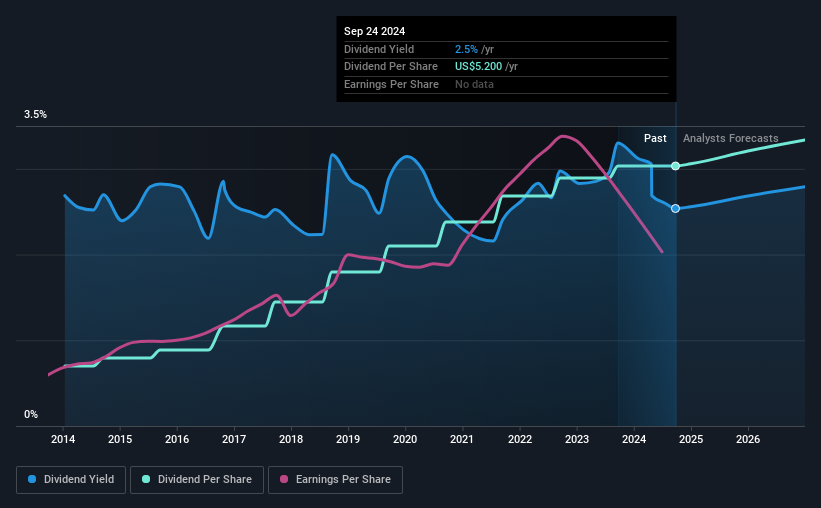- United States
- /
- Semiconductors
- /
- NasdaqGS:TXN
Texas Instruments (NASDAQ:TXN) Is Paying Out A Larger Dividend Than Last Year
The board of Texas Instruments Incorporated (NASDAQ:TXN) has announced that the dividend on 12th of November will be increased to $1.36, which will be 4.6% higher than last year's payment of $1.30 which covered the same period. This makes the dividend yield 2.5%, which is above the industry average.
Check out our latest analysis for Texas Instruments
Texas Instruments' Payment Could Potentially Have Solid Earnings Coverage
A big dividend yield for a few years doesn't mean much if it can't be sustained. Prior to this announcement, Texas Instruments' dividend was making up a very large proportion of earnings and perhaps more concerning was that it was 318% of cash flows. Paying out such a high proportion of cash flows certainly exposes the company to cutting the dividend if cash flows were to reduce.
The next year is set to see EPS grow by 53.5%. If the dividend continues along recent trends, we estimate the payout ratio will be 68%, which would make us comfortable with the sustainability of the dividend, despite the levels currently being quite high.

Texas Instruments Has A Solid Track Record
The company has been paying a dividend for a long time, and it has been quite stable which gives us confidence in the future dividend potential. Since 2014, the annual payment back then was $1.20, compared to the most recent full-year payment of $5.20. This works out to be a compound annual growth rate (CAGR) of approximately 16% a year over that time. We can see that payments have shown some very nice upward momentum without faltering, which provides some reassurance that future payments will also be reliable.
The Dividend's Growth Prospects Are Limited
Investors could be attracted to the stock based on the quality of its payment history. Although it's important to note that Texas Instruments' earnings per share has basically not grown from where it was five years ago, which could erode the purchasing power of the dividend over time. Earnings are not growing quickly at all, and the company is paying out most of its profit as dividends. When the rate of return on reinvestment opportunities falls below a certain minimum level, companies often elect to pay a larger dividend instead. This is why many mature companies often have larger dividend yields.
Texas Instruments' Dividend Doesn't Look Sustainable
Overall, we always like to see the dividend being raised, but we don't think Texas Instruments will make a great income stock. We can't deny that the payments have been very stable, but we are a little bit worried about the very high payout ratio. We would be a touch cautious of relying on this stock primarily for the dividend income.
Market movements attest to how highly valued a consistent dividend policy is compared to one which is more unpredictable. Meanwhile, despite the importance of dividend payments, they are not the only factors our readers should know when assessing a company. For example, we've picked out 2 warning signs for Texas Instruments that investors should know about before committing capital to this stock. If you are a dividend investor, you might also want to look at our curated list of high yield dividend stocks.
Mobile Infrastructure for Defense and Disaster
The next wave in robotics isn't humanoid. Its fully autonomous towers delivering 5G, ISR, and radar in under 30 minutes, anywhere.
Get the investor briefing before the next round of contracts
Sponsored On Behalf of CiTechValuation is complex, but we're here to simplify it.
Discover if Texas Instruments might be undervalued or overvalued with our detailed analysis, featuring fair value estimates, potential risks, dividends, insider trades, and its financial condition.
Access Free AnalysisHave feedback on this article? Concerned about the content? Get in touch with us directly. Alternatively, email editorial-team (at) simplywallst.com.
This article by Simply Wall St is general in nature. We provide commentary based on historical data and analyst forecasts only using an unbiased methodology and our articles are not intended to be financial advice. It does not constitute a recommendation to buy or sell any stock, and does not take account of your objectives, or your financial situation. We aim to bring you long-term focused analysis driven by fundamental data. Note that our analysis may not factor in the latest price-sensitive company announcements or qualitative material. Simply Wall St has no position in any stocks mentioned.
About NasdaqGS:TXN
Texas Instruments
Designs, manufactures, and sells semiconductors to electronics designers and manufacturers in the United States, China, rest of Asia, Europe, Middle East, Africa, Japan, and internationally.
Acceptable track record with mediocre balance sheet.
Similar Companies
Market Insights
Weekly Picks

Early mover in a fast growing industry. Likely to experience share price volatility as they scale


A case for CA$31.80 (undiluted), aka 8,616% upside from CA$0.37 (an 86 bagger!).


Moderation and Stabilisation: HOLD: Fair Price based on a 4-year Cycle is $12.08
Recently Updated Narratives

Airbnb Stock: Platform Growth in a World of Saturation and Scrutiny

Adobe Stock: AI-Fueled ARR Growth Pushes Guidance Higher, But Cost Pressures Loom

Thomson Reuters Stock: When Legal Intelligence Becomes Mission-Critical Infrastructure
Popular Narratives


Crazy Undervalued 42 Baggers Silver Play (Active & Running Mine)


NVDA: Expanding AI Demand Will Drive Major Data Center Investments Through 2026


The AI Infrastructure Giant Grows Into Its Valuation
Trending Discussion




